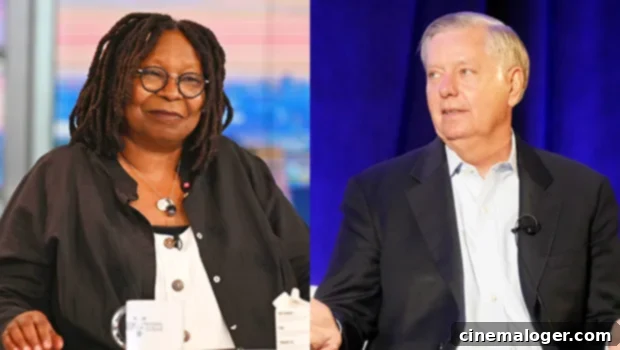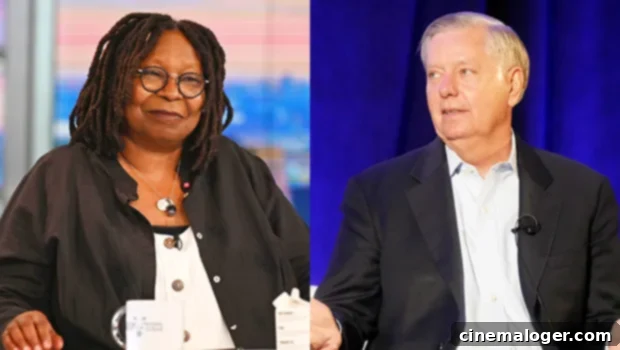Whoopi Goldberg’s Controversial Quip: Unpacking the “Getting Married” Joke and Its Aftermath
Daytime television often serves as a vibrant forum for discussing pressing social and political issues, and few shows navigate these waters with as much verve as The View. On a notable Thursday, September 22, the program became the stage for a lively discussion that quickly escalated into a mini-controversy, featuring acclaimed host Whoopi Goldberg and White House Press Secretary Karine Jean-Pierre. The topic at hand was the critical intersection of abortion rights and marriage equality, a conversation that led to a comment by Goldberg aimed at Republican Senator Lindsey Graham. What began as a pointed observation soon transformed into a national talking point, compelling Goldberg to offer a clarification and defense of her remarks after a commercial break. She succinctly stated, “It was a joke. Nothing more than that,” yet the sentiment behind the quip resonated deeply within the polarized landscape of American politics and media.
The segment’s intensity was primarily fueled by Jean-Pierre’s sharp critique of Senator Graham’s recently proposed nationwide abortion ban. Her warning was stark and direct: such a legislative move would not merely impact reproductive rights but could establish a dangerous precedent, potentially paving the way for challenges to other fundamental rights. “It’s not just abortion. It’s going to be on marriage. It’s going to be on contraception. It’s going to be on our privacy,” Jean-Pierre articulated, underscoring the interconnectedness of these civil liberties. She highlighted what she perceived as a glaring inconsistency in Graham’s stance, noting his prior declaration—made just a month earlier, in early August—that issues like marriage and abortion should exclusively be decided by individual states. This abrupt reversal prompted her direct challenge: “So, Senator Graham, what changed?” This question hung in the air, setting the stage for Goldberg’s ensuing, much-discussed remark.

The Comedian’s Quip and Its Immediate Fallout
It was in response to Jean-Pierre’s rhetorical question regarding Senator Graham’s shift in policy that Whoopi Goldberg delivered the line that would ignite significant debate. With her characteristic blend of humor and candidness, she quipped, “Maybe he’s getting married. Do it quick, because I know people are fooling around with our marriage rights.” While on the surface, the comment might appear as a lighthearted jest, its underlying implication was quickly recognized and interpreted by various viewers and commentators. Goldberg, a seasoned comedian and public figure known for her outspoken nature, offered no explicit statement about the senator’s sexual orientation. However, a segment of the audience and media outlets perceived her remark as a veiled insinuation, linking Graham’s political stance on marriage equality to his personal life.
The conservative media sphere was quick to react. Nicholas Fondacaro, an editor for the Media Research Center and conservative outlet Newsbusters, took to Twitter to voice his strong disapproval. He publicly accused Goldberg of “dabbling in homophobic bigotry,” contending that her comment was not merely an innocent joke but a deliberate jab. Fondacaro articulated his interpretation, stating, “This plays to the smear that Graham is closeted.” His reaction underscored the sensitive nature of the topic, particularly in the highly charged environment of political commentary, where even a seemingly innocuous joke can be scrutinized for deeper, potentially offensive meanings. The incident swiftly transformed into a discussion not just about political policy but about the boundaries of humor, satire, and personal attacks in public discourse.
Whoopi’s Defense: Comedy vs. Controversy
As The View returned from its commercial break, the lingering tension from Goldberg’s comment was palpable. Whoopi, understanding the furor her words had caused, took the opportunity to explain her intentions and defend her comedic approach. “I was doing what I do as a comic. Sometimes I make jokes,” she clarified, emphasizing her professional identity and the nature of her craft. She openly acknowledged the misunderstanding that had arisen, expressing a degree of exasperation: “I just got a whole conversation about people misunderstanding the joke. I mean, okay. I should probably never do this show again if this is what it’s coming to. It was a joke, guys.” Her defense highlighted the perennial challenge faced by comedians and public figures: the delicate balance between intent and reception, particularly when addressing politically sensitive subjects. While Goldberg saw her comment as a comedic observation on hypocrisy, others perceived it as an offensive insinuation. This incident perfectly encapsulated the difficulty of navigating humor in an era where public figures are held to increasingly stringent standards of political correctness and sensitivity.
The controversy surrounding the “getting married” joke wasn’t an isolated incident for Whoopi Goldberg, who has a long history of making provocative statements and engaging in heated debates on air. Her tenure on The View has been marked by numerous instances where her candid opinions have sparked widespread discussion, some leading to significant backlash. For example, her interactions with Republican Senator Graham have previously drawn attention. When he questioned Supreme Court Justice Ketanji Brown Jackson during her confirmation hearings, Goldberg did not mince words, stating that he should be “ashamed.” Her criticism stemmed from the fact that Graham had previously voted to confirm Jackson for the D.C. Court of Appeals, making his subsequent grilling during her Supreme Court nomination appear inconsistent and politically motivated in Goldberg’s view. These instances showcase Goldberg’s consistent willingness to challenge political figures, regardless of party affiliation, when she perceives a misalignment between their actions and stated principles.
A History of Provocation and Apology
Perhaps the most significant controversy Goldberg faced in recent memory occurred in February, when she made a widely criticized comment on The View regarding the Holocaust. During a discussion, she controversially stated that the Holocaust was “not about race.” This remark immediately drew fire from Jewish advocacy groups and the wider public, who rightly pointed out the undeniable racial underpinnings of Nazi ideology and the horrific persecution of Jewish people as a distinct race. Recognizing the gravity of her error, Goldberg issued a public apology in the very next episode, demonstrating humility and a commitment to understanding. She invited Anti-Defamation League CEO Jonathan Greenblatt onto the show, who eloquently explained why such comments were deeply harmful and historically inaccurate. Despite her sincere apology and willingness to learn, the network deemed the situation serious enough to warrant disciplinary action. She was suspended for two weeks from the show, a rare move for a prominent host. Upon her return, Goldberg expressed profound gratitude to those who helped educate her during her time away from the screen. “I listened to everything everybody had to say, and I was very grateful. I hope it keeps the important conversations happening, because we’re going to keep having tough conversations,” she stated, emphasizing the ongoing need for dialogue and understanding, even when those conversations are difficult or uncomfortable.
The recurring pattern of Whoopi Goldberg making controversial statements, facing public scrutiny, and then engaging in dialogue or offering apologies underscores the complex role of talk show hosts in contemporary media. As a comedian and a co-host on a highly visible program, Goldberg often walks a tightrope between offering sharp political commentary and risking misinterpretation or offense. Her “getting married” joke, while intended as a satirical jab at perceived political hypocrisy, became another instance where her comedic delivery intersected with deeply sensitive social issues. This highlights the ongoing challenge for public figures to engage in political discourse with both humor and sensitivity, especially in a media landscape where every word is scrutinized and amplified. Ultimately, these incidents serve as potent reminders of the power of words, the subjectivity of humor, and the vital, albeit often contentious, role that shows like The View play in shaping public opinion and fostering national conversations.
